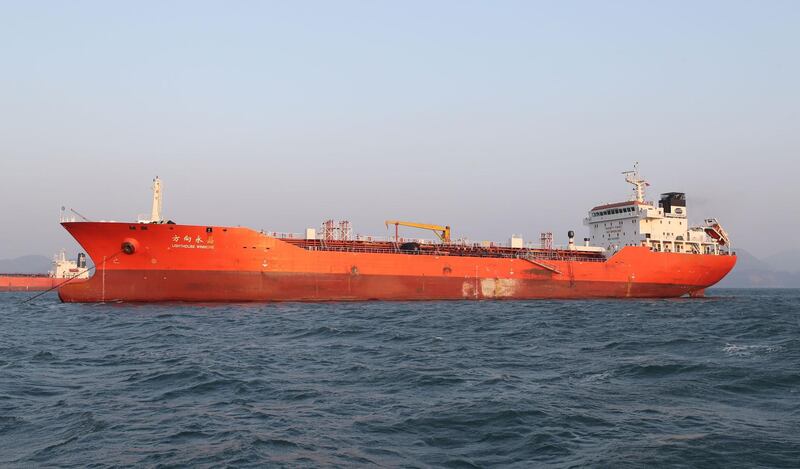South Korea said Friday that it was holding a Hong Kong-flagged ship and its crew members for allegedly violating UN sanctions by transferring oil to a North Korean vessel in October.
The Lighthouse Winmore is believed to have transferred about 600 tonnes of refined petroleum products to the North Korean ship, the Sam Jong 2, in international waters in the East China Sea on October 19, after leaving the South Korean port of Yeosu, a South Korean foreign ministry official said.
South Korean customs authorities boarded the ship and interviewed crew members after they returned to Yeosu on November 24. South Korea formally seized the ship after the UN Security Council on December 22 imposed new sanctions on North Korea that allow member states to seize, inspect and freeze vessels that are suspected of transferring banned goods to or from North Korea, the official said.
The ship's 25 crew members — 23 of them Chinese nationals and two from Myanmar — are being held at Yeosu but will be allowed to leave South Korea after authorities are finished investigating them, the official said. South Korea plans to report the results of its inspection to the Security Council's sanctions committee.
The ship, which also transferred oil to three other non-North Korean ships, was chartered by Taiwan's Billions Bunker Group and stopped in South Korea to load about 14,000 tonnes of Japanese oil products. It claimed its destination as Taiwan when leaving Yeosu on October 15, the official said.
The official said it had not been confirmed whether the Sam Jong 2 returned to North Korea after receiving oil from the Lighthouse Winmore.
______________
Read more:
[ North Korea condemns new UN sanctions as an 'act of war' ]
[ Russia steps in as mediator as North Korea prepares to launch satellite ]
_____________
The US treasury department last month sanctioned six North Korean shipping and trading companies and 20 of their vessels, and published photos of what it said was a North Korean vessel on October 19 possibly transferring oil to evade sanctions. The department identified the ship in the photos as the Rye Song Gang 1.
North Korea has come under heavy UN sanctions as it accelerated efforts to expand its nuclear weapons and ballistic missiles programme. In recent months, the North conducted its most powerful nuclear test to date and flight-tested intercontinental ballistic missiles three times, raising concerns it is closer than ever toward gaining a military arsenal that can target the United States.
Ship-to-ship trade with North Korea at sea is prohibited under UN sanctions adopted on September 11.
The South Korean revelations of the ship inspection came hours after US president Donald Trump criticised China following previous reports that Chinese ships transferred oil to North Korean vessels at sea.
Mr Trump said on Twitter that China had been "Caught RED HANDED," adding that he was "very disappointed that China is allowing oil to go into North Korea".
"There will never be a friendly solution to the North Korea problem if this continues to happen!" the president said, without citing the source of his information.
He later told The New York Times, "It was reported this morning, and it was reported on Fox."
China dismissed Mr Trump's claim. The foreign ministry spokeswoman Hua Chunying said "the recent series of reports on this situation do not conform with the facts".
She said Beijing did not allow its "citizens or companies to engage in any activities that violate" UN resolutions.
China accounts for the vast majority of North Korea's external trade and oil supplies.





